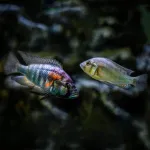(Press-News.org) Social stress is bad for your brain. It’s a prime suspect in the accumulation of oxidative stress in the brain, which is believed to contribute to mental health and neurodegenerative disorders — but the mechanisms that turn social stress into oxidative stress, and how social status affects this, are poorly understood. By studying a highly social, very hierarchical fish species, cichlids, scientists have now found that social stress raises oxidative stress in the brains of low-status fish.
“We found that low rank was generally linked to higher levels of oxidative stress in the brain,” said Dr Peter Dijkstra of Central Michigan University, lead author of the article in Frontiers in Behavioral Neuroscience. “The patterns of oxidative stress in the brain are likely influenced by social experience modulating cellular processes in the brain.”
A fish-eat-fish world
Male cichlids have a strict, highly visible social hierarchy. Dominant males, which have higher levels of androgen hormones, are larger, more aggressive, and more colorful than subordinate males. They defend territories and court females. Hormones like androgens which are triggered by social stress have been linked to oxidative stress changes in several organs — so cichlids, with stressful social lives tightly linked to androgen levels, are ideal for studying the impact of social stress on oxidative stress levels.
The scientists set up 15 large tanks divided in two, and placed six females and two males in each experimental compartment, allowing each group of fish to interact freely and to visually interact with the neighboring group. They also added half a flowerpot to each compartment, to give the dominant male a territory to defend. To quantify the cichlids’ behavior, the scientists filmed them and recorded the behaviors witnessed. In all but two groups, the cichlids rapidly developed a hierarchy, which remained stable over the weeks of the experiment.
Eventually, the researchers took blood samples from the male fish and dissected their brains, as well as measuring their size and length and the size of their gonads relative to their body. (Larger gonads indicate higher levels of androgens.) In each division of each brain, they measured markers of oxidative stress and antioxidant capacity, which counteracts oxidative stress. They also quantified the oxidant capacity and oxidative DNA damage present in each brain section.
Stressful society
The scientists found that the low-status fish had higher levels of oxidative stress and lower antioxidant capacity than the high-status fish. Although the higher-status fish had higher indicators for oxidative stress in their blood, their brains seemed to be protected. Indicators of reproductive activity, associated with high status in these fish, were linked to higher levels of antioxidants and lower levels of oxidative stress in the brain. This could be linked to their levels of androgens, which can be neuroprotective in some cases. Low-status fish had smaller gonads and therefore lower androgen levels.
However, the effects of status on oxidative stress are complex. When the scientists looked at markers of oxidative DNA damage and antioxidant capacity in different brain divisions, they found that different markers were differently impacted by social status.
“It's important to note that the patterns detected relative to oxidative stress in the brain may not be 'bad' for the animal,” said Dijkstra. “Maybe in the future we will study the fitness consequences of oxidative stress in the brain. But showing that patterns of oxidative stress are linked to social stress is important, and may provide important insights into mechanisms by which social stressors promote oxidative stress and disease in the brain.”
“Social competition in our cichlids is a great model system to understand how competition in our modern human societies influences important physiological functions,” added Dijkstra. “We compare ourselves to others continuously, and these problems are especially compounded by social media. But I would be hesitant to directly relate our findings to human societies.”
The researchers also cautioned that more targeted studies will be needed to understand the impact of the interplay between social stress and oxidative stress on specific brain regions.
“I think we just uncovered some interesting patterns across different divisions of the brain,” said Dijkstra. “The next step is to understand the regulation of oxidative stress better and how social stress influences this. This requires more rigorous experimental studies.”
END
Social fish with low status are so stressed out it impacts their brains
Scientists show that low-status male cichlid fish have higher levels of oxidative stress in their brain, which is linked to poorer mental and neurological health in humans
2024-11-26
ELSE PRESS RELEASES FROM THIS DATE:
Predicting the weather: New meteorology estimation method aids building efficiency
2024-11-26
Due to the growing reality of global warming and climate change, there is increasing uncertainty around meteorological conditions used in energy assessments of buildings. Existing methods for generating meteorological data do not adequately handle the interdependence of meteorological elements, such as solar radiation, air temperature, and absolute humidity, which are important for calculating energy usage and efficiency.
To address this challenge, a research team at Osaka Metropolitan University’s Graduate School of Human Life and Ecology—comprising Associate ...
Inside the ‘swat team’ – how insects react to virtual reality gaming
2024-11-26
Humans get a real buzz from the virtual world of gaming and augmented reality but now scientists have trialled the use of these new-age technologies on small animals, to test the reactions of tiny hoverflies and even crabs.
In a bid to comprehend the aerodynamic powers of flying insects and other little-understood animal behaviours, the Flinders University-led study is gaining new perspectives on how invertebrates respond to, interact with and navigate virtual ‘worlds’ created by advanced entertainment technology.
Published in the ...
Oil spill still contaminating sensitive Mauritius mangroves three years on
2024-11-26
Three years after bulk carrier MV Wakashio ran aground on a coral reef off Mauritius, spilling 1000 tonnes of a new type of marine fuel oil, Curtin University-led research has confirmed the oil is still present in an environmentally sensitive mangrove forest close to important Ramsar conservation sites.
Lead researcher Dr Alan Scarlett, from Curtin’s WA Organic and Isotope Geochemistry Centre in the School of Earth and Planetary Sciences, said the chemical ‘fingerprint’ of the oil found ...
Unmasking the voices of experience in healthcare studies
2024-11-26
Researchers are calling for a formal process that recognises and acknowledges the invaluable contributions of those with lived experience in healthcare research.
New research by Flinders University published in the Patient Education and Counselling journal exposes underlying issues in academic engagement and calls for better processes to credit those with lived experiences.
“With the growing awareness of the importance of diversity and inclusion in research, it is time for the research community to monitor not only how often, but also how well people with lived experience are involved,” says Associate Professor Elizabeth Lynch.
Associate Professor Lynch from the College of ...
Pandemic raised food, housing insecurity in Oregon despite surge in spending
2024-11-26
Despite a heavy infusion of public and private support during the COVID-19 pandemic, Medicaid and Medicare beneficiaries in Oregon reported that housing and food insecurity shot up during the onset of the pandemic in March of 2020 — and their basic needs remained in doubt through at least the end of the following year.
The survey data were reported in a study led by Oregon Health & Science University and published today in the Annals of Family Medicine.
The Oregon study provides a state-specific dimension to a nationwide survey ...
OU College of Medicine professor earns prestigious pancreatology award
2024-11-26
Min Li, Ph.D., a George Lynn Cross Professor of Medicine, Surgery and Cell Biology at the University of Oklahoma College of Medicine and Associate Director for Global Oncology at OU Health Stephenson Cancer Center, will receive the 2024 Palade Prize from the International Association of Pancreatology.
The Palade Prize, the IAP’s most distinguished award for research excellence, recognizes Li’s contributions to the field of pancreatology, which is dedicated to discovering new methods of identifying, diagnosing and treating diseases of the pancreas such as pancreatic ...
Sub-Saharan Africa leads global HIV decline: Progress made but UNAIDS 2030 goals hang in balance, new IHME study finds
2024-11-26
**Embargo: 23.30 [UK time], 6:30 p.m. [ET], 3:30 p.m. [PT], Monday, November 25 2024**
In contrast, the percentage of the population without a suppressed level of HIV (PUV) increased by 116.1% in Central Europe, Eastern Europe, and Central Asia from 2003 to 2021.
The study authors are issuing recommendations to invigorate the global HIV response across global public health programs dedicated to HIV control and expansion of prevention services.
The Institute for Health Metrics and Evaluation (IHME) has published a new study in The Lancet HIV journal that revealed significant progress in the global fight against HIV/AIDS, alongside ...
Popular diabetes and obesity drugs also protect kidneys, study shows
2024-11-26
The biggest and most comprehensive analysis of glucagon-like peptide-1 (GLP-1) receptor agonists on kidney and cardiovascular outcomes shows they have significant benefits in people with and without diabetes.1 Findings were published today in The Lancet Diabetes & Endocrinology.
Originally developed to treat diabetes, GLP-1 receptor agonists mimic the action of a hormone called glucagon-like peptide 1, which stimulates insulin production and lowers blood sugar levels. More recently, they have emerged as effective treatments for obesity - slowing digestion, ...
Stevens INI receives funding to expand research on the neural underpinnings of bipolar disorder
2024-11-25
Leila Nabulsi, PhD, a postdoctoral researcher in computational neuroscience at the Keck School of Medicine of USC’s Mark and Mary Stevens Neuroimaging and Informatics Institute (Stevens INI) has received funding to expand research on the neurocircuitry that underlies bipolar disorder. Nabulsi was awarded the prestigious 2025 NARSAD Young Investigator Grant from the Brain & Behavior Research Foundation, a highly competitive grant that provides early-career researchers with crucial pilot funding to pursue new avenues in ...
Protecting nature can safeguard cities from floods
2024-11-25
A new UBC-led study shows that safeguarding key natural ecosystems across Canada can help reduce flood risks for more than half of the country’s urban areas at high risk for flooding.
The research reveals that preserving the most important five per cent of watersheds—about 201,000 square kilometres or two per cent of Canada’s land—can significantly reduce rainwater runoff, protect homes and livelihoods, and safeguard croplands.
“This is the first national study to assess the role of Canadian ecosystems in flood prevention and to identify where conservation could have the greatest impact,” said Dr. Matthew ...
LAST 30 PRESS RELEASES:
ASU researchers to lead AAAS panel on water insecurity in the United States
ASU professor Anne Stone to present at AAAS Conference in Phoenix on ancient origins of modern disease
Proposals for exploring viruses and skin as the next experimental quantum frontiers share US$30,000 science award
ASU researchers showcase scalable tech solutions for older adults living alone with cognitive decline at AAAS 2026
Scientists identify smooth regional trends in fruit fly survival strategies
Antipathy toward snakes? Your parents likely talked you into that at an early age
Sylvester Cancer Tip Sheet for Feb. 2026
Online exposure to medical misinformation concentrated among older adults
Telehealth improves access to genetic services for adult survivors of childhood cancers
Outdated mortality benchmarks risk missing early signs of famine and delay recognizing mass starvation
Newly discovered bacterium converts carbon dioxide into chemicals using electricity
Flipping and reversing mini-proteins could improve disease treatment
Scientists reveal major hidden source of atmospheric nitrogen pollution in fragile lake basin
Biochar emerges as a powerful tool for soil carbon neutrality and climate mitigation
Tiny cell messengers show big promise for safer protein and gene delivery
AMS releases statement regarding the decision to rescind EPA’s 2009 Endangerment Finding
Parents’ alcohol and drug use influences their children’s consumption, research shows
Modular assembly of chiral nitrogen-bridged rings achieved by palladium-catalyzed diastereoselective and enantioselective cascade cyclization reactions
Promoting civic engagement
AMS Science Preview: Hurricane slowdown, school snow days
Deforestation in the Amazon raises the surface temperature by 3 °C during the dry season
Model more accurately maps the impact of frost on corn crops
How did humans develop sharp vision? Lab-grown retinas show likely answer
Sour grapes? Taste, experience of sour foods depends on individual consumer
At AAAS, professor Krystal Tsosie argues the future of science must be Indigenous-led
From the lab to the living room: Decoding Parkinson’s patients movements in the real world
Research advances in porous materials, as highlighted in the 2025 Nobel Prize in Chemistry
Sally C. Morton, executive vice president of ASU Knowledge Enterprise, presents a bold and practical framework for moving research from discovery to real-world impact
Biochemical parameters in patients with diabetic nephropathy versus individuals with diabetes alone, non-diabetic nephropathy, and healthy controls
Muscular strength and mortality in women ages 63 to 99
[Press-News.org] Social fish with low status are so stressed out it impacts their brainsScientists show that low-status male cichlid fish have higher levels of oxidative stress in their brain, which is linked to poorer mental and neurological health in humans




